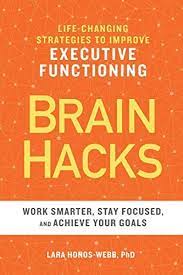Author: Lara Honos-Webb, PhD
ISBN number: 13. 978–1641521604
APA Style Citation
Honos-Webb. (2018). Life-changing Strategies to Improve Executive Functioning. Althea Press.
Buy This Book
BRAIN HACKS: Life-Changing Strategies to Improve Executive Functioning: Honos-Webb PhD, Lara: 9781641521604: Amazon.com: Books
| brain_hacks_activity.pdf |
According to the APA dictionary, executive function refers to a wide range of high-level cognitive processes (planning, decision-making, problem-solving, action sequencing, task assignment and organization, effortful and persistent goal pursuit, inhibition of competing impulses, flexibility in goal selection, and goal-conflict resolution. These skills often involve language, judgment, abstraction, concept formation, logic, and reasoning). They are related to neural networks in the frontal lobes and especially the prefrontal cortex.
Although there is no definitive set of executive functions (researchers define them differently), in Brain Hacks, the author focuses on five specific areas of executive functioning: focus and attention, planning and organization, cognitive flexibility, emotional regulation, and impulse control. Each of the areas is interconnected, and increasing one ability will improve the others. The author is a practicing clinical psychologist who shares her ideas for improving executive functioning across multiple areas. The text begins with short yes/no questionnaires for each of the five executive functioning areas.
Sample Questions from the Organization and Planning Executive Function Assessment
- Do you have multiple calendars or apps to manage your time, yet use them infrequently?
- Do you miss out on opportunities because you forget to follow up or track important contacts you have made?
- Do friends, teachers, or family members complain that your space is sloppy?
By counting the number of yes responses, students will have a general idea of which of these areas of executive functioning are the most likely sources of challenges or problems. The areas with lower numbers of yes responses are areas of greater strength.
The book provides specific exercises and methods to improve each area of executive functioning, which can be incorporated into classroom activities and projects. Improving in these areas of functioning, according to author Lara Honos-Webb increases personal, academic, and professional success. Improving executive functioning also can lead to increased work-life balance, reduced stress, and improved relationships. The exercises emphasize how small, continual efforts over time create meaningful growth.
Each chapter emphasizes a separate area of executive functioning, provides a summary and background information, including psychological and biological influences, and ends with a bulleted list of key takeaways. There is also a series of exercises, tips, and special “brain hacks” to improve executive functioning. Brain hacks are tips for using the mind’s innate abilities to learn and improve to the greatest advantage. The book is designed as a tool to be used continually instead of being read once as inspiration and is laid out efficiently to find ways to increase functioning in everyday life mindfully. In the psychology classroom, the “brain hacks” and exercises can become engaging classroom activities and projects that allow students to apply what they learn in a personal manner. These activities can be spread across various units in a psychology course, including motivation and emotion, stress and health, neuroscience, memory, clinical, and developmental to increase student engagement and build metacognitive skills.
Other Related Resources
Author’s Website- Lara Honos-Webb, Ph.D., author, and licensed clinical psychologist in private practice
A short video on executive functioning (3 min, 21 sec) Stephanie Carlson, PhD
WebMD Executive functioning and executive functioning disorder
Weill Institutes for Neuroscience Memory and Aging Center University of California, San Francisco
Cognitive flexibility
Emotional regulation
Executive functioning
Exposure therapy
Fixed mindset
Focus and attention
Growth mindset
Impulse control
Metacognition
Motivation
Multitasking
Neuroplasticity
Planning and organization
Prefrontal cortex
Resilience
Working memory

 RSS Feed
RSS Feed